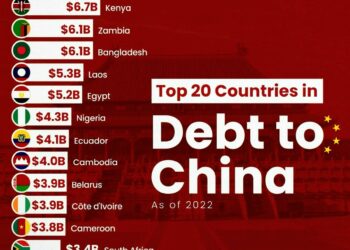Select Language:
Top 50 Most Powerful Countries in the World in 2025
United States Dominates Global Power Rankings
The United States continues to hold its position as the most influential country on the planet, thanks to its unparalleled military capabilities, economic strength, and extensive international alliances. With a GDP surpassing $25 trillion and leading advancements in technology and innovation, the U.S. remains the primary driver of global affairs. Its leadership in defense and diplomacy shapes policies across continents, solidifying its status at the pinnacle of global power in 2025. The country’s soft power, rooted in cultural influence and technological innovation, further cements its position atop this list.
China Strengthens Its Global Position
China has cemented its status as the second most powerful nation in the world. With a rapidly expanding economy valued at over $18 trillion, China’s infrastructural investments, technological advancements, and strategic global outreach, especially through initiatives like the Belt and Road, have increased its influence worldwide. Its military modernization continues steadily, making it a key player in regional and global security matters. China’s growing diplomacy and economic partnerships indicate a persistent ascent, challenging traditional Western dominance.
Russia Maintains Its Strategic Influence
Russia retains its position within the top three, leveraging its vast military resources and strategic alliances to influence regional conflicts and global security initiatives. Its nuclear capabilities and energy resources provide significant leverage, especially in Europe and Asia. Russia’s involvement in cyber diplomacy and military interventions underscores its role as a formidable power with considerable influence in geopolitics.
United Kingdom Remains a Key Global Player
Despite economic shifts, the UK continues to wield significant political and diplomatic influence. Its strong military, international intelligence network, and historical ties keep it relevant on the world stage. London remains a hub for global finance and diplomacy, with a close alliance with the United States and strategic partnerships across Europe and Asia.
Germany’s Economic Power Drives Continental Influence
As Europe’s largest economy, Germany plays a pivotal role within the European Union. Its technological innovation, manufacturing strength, and stable political environment make it an essential actor in global trade and policy. Germany leads efforts within the EU to tackle climate change, digital transformation, and economic resilience.
South Korea: An Economic and Military Force
South Korea’s technological industry, particularly in semiconductors and electronics, continues to thrive. Its military strength and strategic alliances, especially with the United States, position it as a critical player in the Asia-Pacific region. Seoul’s rising geopolitical influence reflects its economic resilience and innovation-driven growth.
France’s Cultural and Diplomatic Clout
Beyond its rich cultural heritage, France maintains a significant role in global diplomacy, nuclear diplomacy, and economic influence within the EU. Paris actively participates in international peacekeeping and climate initiatives, reinforcing its status as a key player on the world stage.
Japan’s Technological and Economic Leadership
Maintaining its status as an innovation hub, Japan is a global leader in robotics, electronics, and automobiles. Its stable government, advanced technology sector, and strategic alliances with the U.S. and other countries bolster its international influence.
Saudi Arabia and the Middle East’s Oil Power
Saudi Arabia remains a dominant energy producer, wielding considerable influence over global oil markets. Its Vision 2030 initiative aims to diversify the economy and modernize society, which could expand its geopolitical clout in the coming years.
Israel’s Advanced Technology and Security Clout
Israel continues to lead in innovation, cybersecurity, and defense technology. Its strategic alliances, notably with the United States, secure its security and influence in the Middle East. Its expertise in technology and intelligence has significant global implications.
[Insert Image: A world map highlighting the top 50 countries based on power rankings]
United Arab Emirates (UAE) and Middle Eastern Growth
The UAE has emerged as a regional hub for finance, trade, and tourism. Its strategic investments in technology and infrastructure have elevated its international stature, aligning with broader Middle Eastern economic diversification efforts.
India’s Rising Global Influence
India’s economy, projected to surpass $3 trillion, is expanding rapidly. Its large population, technological sector, and strategic regional alliances bolster its influence. India is increasingly shaping regional stability and international trade with its growing military capacity and diplomatic outreach.
Canada’s Stable Power Status
Canada remains a vital player due to its resource wealth, stability, and active participation in international organizations. Its leadership in climate change initiatives and peacekeeping efforts add to its global influence.
Ukraine’s Regional Significance
Ukraine continues to be a focal point of geopolitical tension, especially with its ongoing conflict with Russia. Its strategic location and efforts to join Western alliances highlight its importance in regional security dynamics.
Italy and European Cultural Power
Italy continues to exert cultural influence globally through art, cuisine, and fashion. Its active participation within the European Union maintains its role as a key European power.
Iran’s Regional Clout
Iran maintains significant influence in the Middle East through its regional proxies and strategic partnerships. Its nuclear program and regional policies continue to impact global diplomacy.
Turkey’s Strategic Position
Turkey’s geographical location and military modernization make it a vital player in Eurasian geopolitics. Its efforts to join Western institutions and forge new alliances bolster its international presence.
Australia’s Strategic and Economic Role
Australia’s economic resilience, military strength, and regional influence across the Indo-Pacific region cement its status as a key ally for Western powers.
Qatar’s Soft Power and Regional Diplomacy
Qatar’s financial investments, media influence, and diplomatic efforts position it as a noteworthy regional power with global reach.
Switzerland’s Diplomatic Neutrality & Financial Power
Switzerland’s banking, humanitarian aid, and diplomatic neutrality maintain its status as an influential global actor.
Spain’s Growing Global Diplomatic Footprint
Spain plays an essential role within the European Union and maintains cultural influence globally through tourism and commerce.
Brazil’s Economic and Environmental Leadership
Brazil’s vast natural resources, renewable energy initiatives, and regional influence make it a significant South American power.
Singapore: Asia’s Financial Hub
Singapore continues to lead in finance, technology, and logistics, solidifying its position as Southeast Asia’s most influential nation.
Netherlands and Global Trade
The Netherlands’ strategic port infrastructure and progressive policies bolster its standing as a top European trade hub.
Kuwait and Regional Stability
Kuwait’s oil wealth and regional diplomacy underpin its influence in the Gulf Cooperation Council.
Sweden and Innovation
Sweden’s leadership in renewable energy, technology, and social welfare models boosts its international profile.
Denmark’s Sustainability & Innovation
Denmark’s renewable energy policies and technological innovation reinforce its standing as a sustainable nation.
South Africa’s Regional Power
South Africa remains influential in Africa, leveraging its resources and regional leadership roles.
Belarus and Its Geopolitical Strategies
Belarus aligns closely with Russia, influencing regional stability and security dynamics.
Vietnam’s Rapid Growth
Vietnam’s expanding manufacturing sector and growing economy elevate it as a key Southeast Asian power.
Belgium’s Diplomatic Hub
Belgium’s strategic location and European institutions maintain its influence in European politics.
Egypt’s Role in African and Middle Eastern Politics
Egypt’s political stability and strategic location sustain its regional importance.
Mexico’s Economic Growth
Mexico’s trade partnerships and manufacturing sectors continue to expand its regional authority.
Norway’s Advancement in Sustainability
Norway’s leadership in environmental policies and resource management enhances its global influence.
Indonesia: Southeast Asia’s Leader
Indonesia’s population size, economic growth, and strategic position secure its future significance.
Austria and Its Cultural Diplomacy
Austria’s cultural influence and neutrality reinforce its role in international diplomacy.
New Zealand’s Environmental Leadership
New Zealand’s environmental policies and regional influence in Oceania position it as an influential nation.
Poland’s Strategic Growth
Poland’s economic development, military modernization, and regional alliances boost its influence in Eastern Europe.
Thailand’s Growth and Regional Diplomacy
Thailand’s tourism industry and regional leadership maintain its importance in Southeast Asia.
Portugal’s Economic Stability
Portugal’s strategic maritime position supports its growing influence in Atlantic trade.
Argentina’s Regional Leadership
Argentina’s natural resources and regional influence within South America contribute to its growing power.
Colombia’s Economic and Security Role
Colombia’s stability efforts and regional trade development expand its influence.
Malaysia: A Growing Southeast Asian Power
Malaysia’s manufacturing sector, digital economy, and strategic partnerships underscore its rising regional stature.
Luxembourg’s Financial Sphere
Luxembourg’s financial services sector and EU influence remain significant in European and global finance.
Finland’s Innovation & Security
Finland’s advancements in technology and security partnerships bolster its international standing.
Greece’s Economic Revival
Greece’s tourism industry and regional diplomacy contribute to its influence in southeastern Europe.
Bangladesh’s Rapid Development
Bangladesh’s expanding manufacturing base and demographic growth position it as a rising power.
Ireland’s Tech & Finance Hub
Ireland’s booming tech sector and financial services strengthen its global influence.
Philippines’ Strategic Southeast Asian Role
The Philippines’ geopolitical importance and growing economy enhance its regional influence.
Jordan’s Political Stability
Jordan’s strategic location and diplomatic efforts maintain its regional relevance.
This extensive list underscores that global power is multi-faceted—encompassing military strength, diplomatic influence, economic resilience, and soft power. Nations are continuously evolving, shaping a dynamic international landscape in 2025.
Source: U.S. News & World Report 2025





